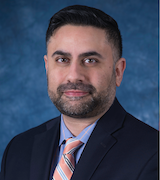Javeed Sukhera

jsukhera@uwo.ca
519-685-8500 Ext. 74968
Google Scholar Link
Current Appointments
Scientist, Centre for Education Research and Innovation
Associate Scientist, Children’s Health Research Institute/Lawson
Educational Background
PhD, Health Professions Education, Maastricht University
MD, Ben-Gurion University
HBSc, University of Toronto
Why Medical Education?
During my early years in practice, I sought to build a bridge between the disparate interests in my academic and clinical life. The lived experience of witnessing injustice towards my patients led me towards medical education research. I knew something had to be done, and I began researching how to have difficult conversations about stigma, equity, and bias. I knew our existing paradigm was flawed. I wanted to dig deeper to better understand how we can advance our efforts to address injustice. Ultimately, medical education research provides a means to address complex problems facing learners and faculty and advance scholarship with the ultimate goal of healthcare system improvement through research and knowledge mobilization.
What Are Your Most Rewarding Career Moments?
There are several moments, big and small, that I would consider rewarding. The most memorable would be my PhD defense and conferral in the Netherlands. I felt like doing a PhD felt like a gift to myself. The completion of this journey was not only a milestone, it was a celebration of becoming the kind of interdisciplinary scientist I had always wanted to be. Another serendipitously rewarding moment was my appointment to the London Police Services Board. This unique opportunity allows me to apply my knowledge and skills towards meaningful changes in public policy that can have an impact on some of the most vulnerable members of our community.
What Is Your Approach to Mentorship?
Mentorship is a gift. Mentors must create a safe, but brave space for mentees. This includes building trust and creating space for mentees to explore and reflect. Allyship is a construct that I often apply to mentorship. This means approaching mentorship with humility, deference, and respect for differences. I have learned a lot from incredible mentors that have supported me throughout my career (especially from CERI!) and I strive to follow the example they have set.
Key Research Questions
- How can we address injustice through health professions education?
- How do structural inequities in the healthcare system influence the education of health professions learners?
- How does teaching and learning about sensitive topics influence the wellbeing of health professional learners and faculty?
Keywords
Equity; Stigma; Mental Health; Bias; Racism








